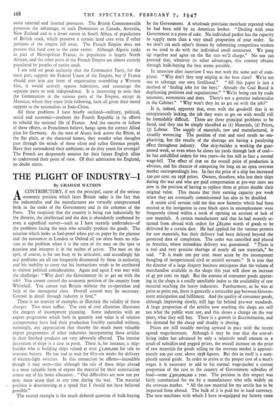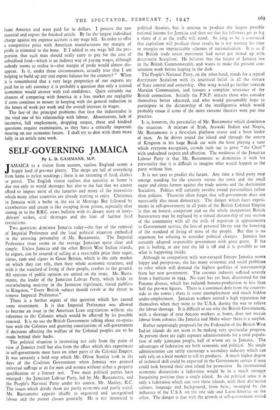THE PLIGHT OF INDUSTRY-I
By GRAHAM WATSON
ACONTRIBUTORY, if not the principal, cause of the serious economic position which faces Britain today is the fact that the industrialist and the manufacturer are virtually unrepresented both in the ranks of the Government and in the columns of the Press. The suspicion that the country is being run industrially by the theorist, the intellectual and the don is abundantly confirmed by even a superficial survey—such as I have recently undertaken—of the problems facing the men who actually produce the goods. The solution which looks so fool-proof when put on paper by the planner and the economist in London or Oxford all too often bears no rela- tion to the problem when it is the turn of the man on the spot to translate and interpret it in the realms of action. The man on the spot, of course, is far too busy to be articulate, and accordingly his real problems are all too frequently discounted by those in authority, and his inability to carry out his instructions tends to be attributed to sinister political considerations. Again and again I was met with the challenge: "Why don't the Government let us get on with the job? You cannot control the economic position of the country from Whitehall. You cannot run Britain without the co-operation and help of the managerial class. Overall control may be necessary. Control in detail through industry is fatal."
There is no scarcity of examples to illustrate the validity of these charges. Two must suffice. The case of coal allocation illustrates the dangers of incompetent planning. Some industries with an export programme which both in quantity and val.& is of relative unimportance have had their production forcibly curtailed without, seemingly, any appreciation that thereby the much more valuable export programmes of other industries incorporating those articles in their finished products are very adversely affected. The interior decoration of ships is a case in point. There is, for instance, -a ship- builder who is building ships valued at over £I,000,000 for sale to overseas buyers. He has had to wait for fifty-six weeks for delivery of electric-light switches. In this connection he affirms—incredible though it may seem—that although the sale of these ships abroad is a most valuable form of export the material for their construction comes out of his home allocation . "Our difficulties are now too per cent. more acute than at any time during the war. The material position is deteriorating at a speed that I should not have believed possible."
The second example is the much debated question of bulk-buying by the Government. A wholesale provision merchant repeated what he had been told by an American broker. "Dealing with your Government is a piece of cake. No individual packer has the capacity to supply more than a very small proportion of your order. So we don't cut each other's throats by submitting competitive tenders as we used to do with the individual small contractor. We gang up together and agree on the flat rate we'll charge." No one can pretend that, whatever its other advantages, this country obtains through bulk-buying the best terms possible.
In interview after interview I was met with the same sort of com- plaint. "Why don't they stop sniping at the boss class? We're not out to sabotage our own livelihood." "All this paper is just a method of 'finding jobs for the boys.' Already the Coal Board is duplicating positions and organisations." "We're being run by trade unionists, economists and dons. There's not a genuine industrialist in the Cabinet." "Why won't they let us get on with the job?"
It is, indeed, apparent that, even with the goodwill that is so conspicuously lacking, the job they want to get on with wourd still be formidably difficult. There are three principal problems to be faced, and they can be simply classified as (I) Materials, (2) Prices, (3) Labour. The supply of materials, raw and manufactured, is steadily worsening. The position of coal and steel needs no em- phasising, but the results of the shortage are having a paralysing effect throughout industry. One ship-builder is working the guar- anteed week, so even when he closes his yards through lack of coal— he has unfulfilled orders for two years—he has still to face a normal wage-bill. The effect of that on the overall price of production is obvious, and his chances of competing for long on an open overseas market correspondingly less. In fact the price of a ship has increased too per cent. on 1938 prices. Owners, therefore, who lost their ships during the war and who gre paid compensation at pre-war rates are now in the position of having to replace them at prices double their original value. This means that their earning capacity per week when they are eventually commissioned has also to be doubled.
A senior civil servant told me that new factories which had been erected at his instigation to cure black spots in unemployment were frequently closed within a week of opening on account of lack of raw materials. A certain manufacturer said that he had recently re- turned from abroad with orders for L62,000 worth of goods to be delivered by a certain date He had applied for the various permits for raw materials, but their delivery had been delayed beyond the promised date of completion. The order was cancelled and placed in America, where immediate delivery was guaranteed. "There is a real and very genuine shortage of nearly all raw materials," he said. "It is made too per cent, more acute by the incompetent bungling of inexperienced civil or uncivil servants." It is true that the director of a large drapery business anticipates that the volume of merchandise available in the shops this year will show an increase of 45 per cent. on 1946. But the amount of consumer goods appear- ing in the shops is a totally unreliable index to the availability of raw material reaching the heavy industries. Furthermore, as he was at pains to point out, there is generally a noticeable gap between Govern- ment anticipation and fulfilment. And the quality of consumer goods, although improving slowly, still lags far behind pre-war standards. A large proportion of the articles now reaching the shops are still not what the public want nor, and this shows a change on the war years, what they will buy. There is a growth in discrimination, and the demand for the cheap and shoddy is abating.
Prices are still steadily moving upward in pace with the recent agreed wage-increases. Although it may be true that the cost-of- living index has advanced by only a relatively small amount as a result of subsidies and pegged prices, the overall increase on the price of raw materials for goods selling on the overseas market is approxi- mately too per cent. above 1938 figures. But this in itself is a com- pletely unreal guide. In order to arrive at the proper cost of a man's wages it is necessary to add to his normal wage-packet a correct proportion of the cost to the country of Government subsidies of food—some L400,000,000 a year. The position in this respect was fairly summarised for me by a manufacturer who sells widely on the overseas market. "All the .raw material for my article has to be imported from abroad. The bulk of it is paid for in hard currency. The new machines with which I have re-equipped my factory came
from America and were paid for in dollars. I process the raw material and export the finished article. By far the largest individual charge against my expense account is my wage bill. In order to offer a competitive price with American manufacturers my margin of profit is trimmed to the bone. If I added to my wage bill the pro- portion that each man should really carry to pay for the cost of subsidised food—which is an indirect way of paying wages, although nobody seems to realise it—that margin of profit would almost dis- appear. Is it, under these circumstances, actually true that I am helping to build up any real export balance for the country?" When it is remembered that a very large proportion of our exports are paid for in soft currency it is probably a question that only a trained economist would answer with real confidence. Quite certainly our chances of competing with America in a free market are negligible if costs continue to mount in keeping with the general reduction in the hours of work per week and the overall increase in wages.
The last of the principal problems that face the industrialist is the vital one of his relationship with labour. Absenteeism, lack of incentive, full employment, dropping output, these and kindred questions require examination, as they have a critically important bearing on our economic future. I shall try to deal with them more fully in an article next week.



































 Previous page
Previous page